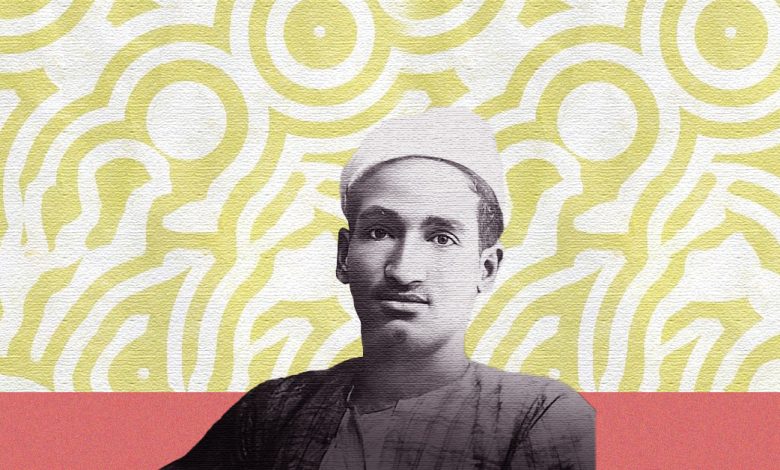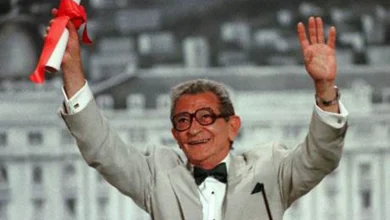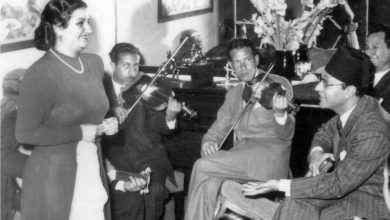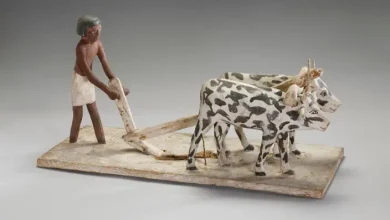
“Dreams” of Sayed Darwish Now
Sayed Darwish passed away on September 15, 1923, at his sister’s house in Moharram Bey. He died with visions and dreams in his heart. His song, “Bardoun Ya Wanjat… Baladna Kharabat” (Cold, O Wanjat… Our country is ruined), with lyrics about bullets fired at the British High Commissioner, is still remembered today. He is remembered in the 1919 revolution when he rode a horse-drawn carriage with Badi’ Khairi, Naguib al-Rihani, and Hassan Fayek. That day, Sayed Darwish climbed onto the carriage driver’s seat in Abdeen Square and sang: “Egypt, do not be afraid… These are their affairs… How can they say there is no freedom or independence?”
***
Sayed Darwish knew Dr. Ali Hassan’s clinic in Bab al-Jadid, which was the headquarters for national meetings to organize demonstrations and unrest during the 1919 revolution, and he began his activity by composing a number of national songs.
He traveled to the Levant, emigrated with his loved ones, and returned to sing in the cafes of the Corniche and teach music to amateurs at the Oriental Music Club. He also knew Sheikh Mufrah Mahmoud, a muezzin and reciter at the Ali al-Badawi Mosque in Kom al-Dikka, who taught Sayed Darwish to memorize the Qur’an and then took him to the “Hassan Halawa” school..
At that time, Sayed Darwish shone in the chanting class, and he once said: “I can compose music.“ He composed ”Ya Ma Sha’ Allah Al-Tuhfajiya… Ahl Al-Latafa wa Al-Mufahmiya” (Oh, God willing, the kind and understanding people) and composed a scene depicting some public scribes on the side of the road, where some farmers came to them to have them write a letter to the Jihad administration and haggled with the public scribe over the fee. Sayyid Darwish still remembers Alexandria, where he was enchanted by the waves and the shores of Alexandria, and loved Jalila and remained flying among the nightingales.
***
And because the night is long… He sang, “As long as the night lasts,” the night of lovers and the night of occupation, and he was freed from “Aman Aman Ya Li” and “Al-Tankit Al-Tarlili,” so he lived with Badi Khairi, and he was a feather on the string, and on paper as well.
Sayed Darwish sang with the canal workers: “O dearest of my eyes, I myself will go to my country.” And he rejected those who went to the canal to take off their helal and wear ‘balto’ in “kambo,” because the Egyptian must rise, because the homeland calls him, and because the sweet one rose to knead from dawn, and our sustenance is from the Lord. In your restored biography, we know, Uncle Sayed, that your sadness is permanent… permanent, because you are always besieged. They sterilize the melodies, corrupting their meanings, so that they end up saying: “My lips are eating me in your presence,” “Without America, without Europe,” and “The good of our country is not in our hands,” to become something else.
The sahbajia is gone, as are the community associations that cared for your heritage and those who listened attentively to your wounds. Do you have the right to blame us? You blame us, but our fate is not in our hands. The kum al-dakka that you knew is now nothing but an old café and tall buildings that block the narrow alleys and streets. The music festival that was organized by the official culture department in your memory has disappeared, where the locals used to sing, “Visit me once a year,” and “I am gone and finished.”




